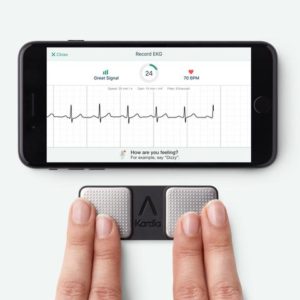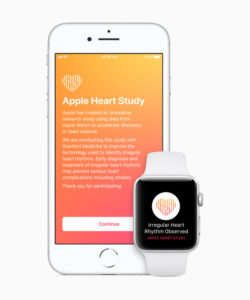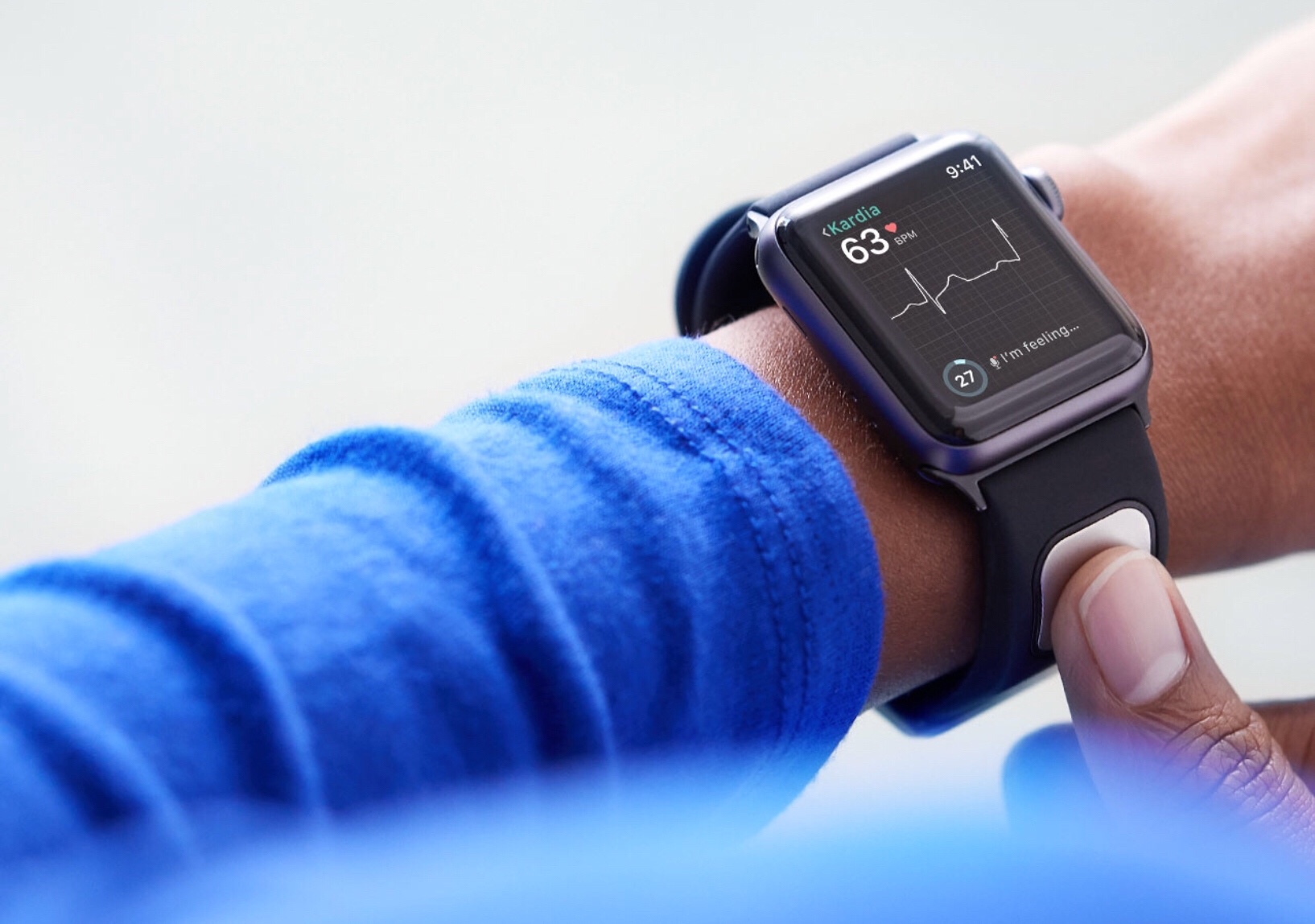Who will win the wearable ECG battle & what does this technology mean for clinicians?
The battle has begun… The Apple Watch has become a legitimate player in personal health monitoring. Now they may also be a contender for dominance in personal ECG monitoring as well, although medical artificial intelligence (AI) giant, AliveCor Inc. has beat them to the punch! What is current status of these two competitors, and what does all of this technology mean to clinicians?
In November, the KardiaBand, the first of its kind, FDA-cleared, clinical grade wearable EKG was released. The band replaces the Apple Watch band, and uses a sensor to take a medical-grade EKG in just 30 seconds. The band’s AI algorithm proved to successfully detect A-Fib and NSR with an accuracy level comparable to physicians interpreting the same ECGs in a recently presented study by the Cleveland Clinic. The KardiaBand is now available, starting at $199, and requires a monthly membership for the associated App.

The band’s creatorAliveCor, has proven in a recently presented study by the Mayo Clinic, that their ECG smartphone appKardiaMobile (which used an eternal sensor device in the study, not the KardiaBand), accurately detected Hyperkalemia non-invasively. Therefore AliveCor believes that the combination of both A.I. algorithms will result in both accurate ECG interpretations and hyperkalemia detection.
But wait…
Just weeks after the KardiaBand received FDA approval, Apple Inc. was rumored to have a prototype for a built-in ECG monitoring in development, which would eliminate the need for accessories or new apps.
The prototype feature for future generation Apple Watches, requires users to squeeze the frame of the Apple Watch with two fingers, and can proactively notify wearers when they may be experiencing A-Fib, or irregular rhythms, according toBloomberg,. Although Apple announced has clearly shown that they are openly researching and testing this technology, currently there is no release date nor FDA approval for their device.
Apple has however, teamed with Stanford Medicine to create the Apple Heart Study app, which is currently available and is being used to collect data in order to “accelerate discovery in heart science” says Apple. The app passively monitors heart rate & rhythm. If an irregular heart rhythm is observed, the user receives a free consultation with a study doctor, and if recommended an electrocardiogram peripheral for additional monitoring. Users who wish to participate in sharing their data for the study can download the app now.
 Frankly in EP we are loving this! Seeing the advancements in personal ECG monitoring not only makes our lives easier, but makes it easier than ever to engage patients in their own heart health and practice preventive medicine!
Frankly in EP we are loving this! Seeing the advancements in personal ECG monitoring not only makes our lives easier, but makes it easier than ever to engage patients in their own heart health and practice preventive medicine!
Although we prefer and are used to proven monitoring technologies, we all know that some patients refuse to use them, discontinue using them early, may not want to undergo implantation of the newer insertable cardiac monitors for long term monitoring, or simply do not know that they have any arrhythmias until a major event occurs.
The proven accuracy of these newer technologies provides us with reliable data, and can easily be used for a plethora of clinical uses:
- Arrhythmia assessment: Evaluation of palpitations, Rule out arrhythmia as cause of palpitations
- Managing patients with AFib: Pre and post ablation, Post cardioversion, Titrate rate and rhythm medications, Track symptoms and rhythm
- Diagnosing AFib early in high risk patients: Post cardiac surgery, In follow up to 30-day continuous monitoring, for cryptogenic stroke, Screening
- Monitoring for Hyperkalemia: Patients with congestive heart failure, chronic kidney disease, diabetes, and with the medications used to treat these conditions; often asymptomatic and can cause lethal arrhythmia’s, and increased mortality
Unfortunately, there are negatives! The KardiaBand is currently not covered by Medicare or insurance. After the costs of the Apple Watch itself, the KardiaBands start at $199, and require a monthly premium membership ($9.99/m or $99/y) in order to store and transmit data to their clinician. They can also choose to have their recordings mailed monthly.
AliveCor states that providers can receive reimbursement for interpreting rhythm strips using CPT code 93040. Their Kardia Pro app (available on iPad) provides offices with the ability to interpret, annotate, electronically sign and upload EKG rhythm strips to the patients electronic health record.
So what’s the conclusion?
We should all be excited about any advancements that help to engage our patients in their personal health. Currently we see patients who bring in their phone and show us recorded events from mobile apps and accessories, which although not FDA approved, nor clinically proven, do alert us to further investigate. Although the KardiaBand, and devices like it to are costly, we all have those patients who love technology, or do not want to use other devices for event monitoring, therefore it is important to stay informed about these technologies, so that we can discuss them as an option.
In regard to the Apple Watch, the information gathered via the Apple Heart Study App should provide a robust amount of data, and hopefully leads to production of the rumored prototype ECG feature in future versions. It seems that it would dominate the wearable ECG market due to it’s popularity, and ease of use without extra accessories or apps to use. Hopefully we see this feature sooner than later! Do not forget, you can encourage your patients with an Apple Watch to join the study now.
Although we are currently inundated with information already, we as providers do have to embrace these new technologies, because they will continue to evolve. We should however appreciate that these advances are helping to actively involve our patients. By monitoring their own health they are more motivated to make healthier choices, seek medical treatment, and communicate with their providers.
Both studies were presented at the American College of Cardiology’s 67th Annual Scientific Session.
Cleveland Clinic study: KardiaBand was able to detect atrial fibrillation with 93 percent sensitivity and 94 percent specificity, roughly equivalent to what a physician could do looking at the same EKG data. With a physician actually examining the data, sensitivity reached 99 percent.
Mayo Clinic study: When paired with new artificial intelligence (A.I.) technology, AliveCor’s ECG device is able to perform non-invasive detection of high potassium levels in blood. The study used over 2 million ECGs linked with 4 million serum potassium values collected between 1994 to 2017, as well as prospective data from an AliveCor smartphone ECG device, to develop an AI algorithm to detect hyperkalemia. The sensitivity for hyperkalemia detection ranged between 90 to 94 percent.

